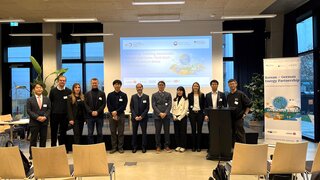WG2 Workshop on Building Sustainable Energy and Green-Tech Startup Businesses in Germany and Korea

On the 28th of November, a workshop and B2B exchange on “Building Sustainable Energy and Green-Tech Startup Businesses in Korea and Germany” took place on the sidelines of the AsiaBerlin Summit 2024 in Berlin, Germany. The workshop was decided within Working Group 2 ‘New Green Energy Technologies’ and was organized by adelphi in cooperation with the Korea International Trade Association (KITA), Hanyang University, AHK Korea, and the Korea Institute of Energy Technology Evaluation and Planning (KETEP). It focused on the topic “How to foster a successful and innovative energy and green-tech startup business in Korea and Germany”. The workshop began with welcome remarks by Dr. Falk Bömeke (BMWK) and Sanghoon Woo (Embassy of the Republic of Korea in Berlin), who both emphasized the important role of startups as the engines of innovation in contributing to a more sustainable future. Afterwards, Sarah Gholiha (German Trade and Invest, GTAI) and Miley Juyeon Ha (Korea International Trade Association,KITA), provided insights into the German and Korean startup ecosystems.
Participants heard practical perspectives on overcoming cultural and market challenges from Korean startup POEN Europe and German company Enapter, who shared their experiences and strategies for cross-border expansion into Germany and Korea. Following a networking break, the event continued with a pitching session featuring innovative energy and green-tech startups from Korea and Germany, and concluded with an interactive panel discussion. This discussion explored strategies to foster success and innovation in the startup sector, emphasizing the importance of local partnerships and understanding regulatory landscapes and cultural differences. Overall, the event provided valuable networking opportunities, and promoted knowledge exchange between Korean and German entrepreneurs, industry experts and political stakeholders. It highlighted the unique characteristics of each country's startup ecosystem and emphasized the importance of connecting and collaborating with local partners to ease the process of entering foreign markets.